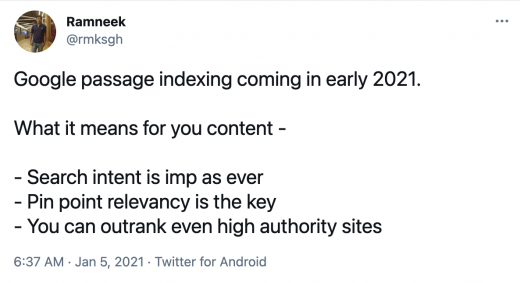BERT and the Pandemic – A New Wave for the Algorithm
BERT and the Pandemic – A New Wave for the Algorithm

While we’re not saying that Google rules the world, the statement is not far from the truth. After all, when somebody is after information, the resounding response is almost always “Google it!” rather than a more mundane “Search for it.”
Anybody who uses the internet for business or pleasure will be only too aware of the importance of Google. The importance ranges from finding a local cake maker to sourcing those all-important business contacts.
BERT and the Pandemic – A New Wave for the Algorithm
Today, it’s the business end of Google that we’ll be looking at and, in particular, its all-star algorithm. If Google is the be-all and end-all of the internet, then BERT is its right-hand man.
Let’s take a look at this controversial algorithm and why it’s more important than ever in 2021.
Sweepin’ The Clouds Away
So, just who, or what — is Bert?
On the hit children’s TV show, Sesame Street, the peculiar-looking Bert plays the straight man to his roommate Ernie’s slapstick pranking, and BERT is very much the same as Baidu’s ERnie.
In 2019, Google announced BERT to help computers to understand language in a more comprehensive and relevant way. Short for Bidirectional Encoder Representations from Transformers (BERT slips off the tongue a little more easily). This groundbreaking algorithm represented a giant leap in network-based natural language processing pre-training.
As soon as the update rolled out in October of 2019, it brought countless ramifications.
BERT had shifted search results of thousands of keywords and phrases to match the intent better. This meant that SEO specialists had to adjust both on-page and off-page efforts to the new NLP-based feature.
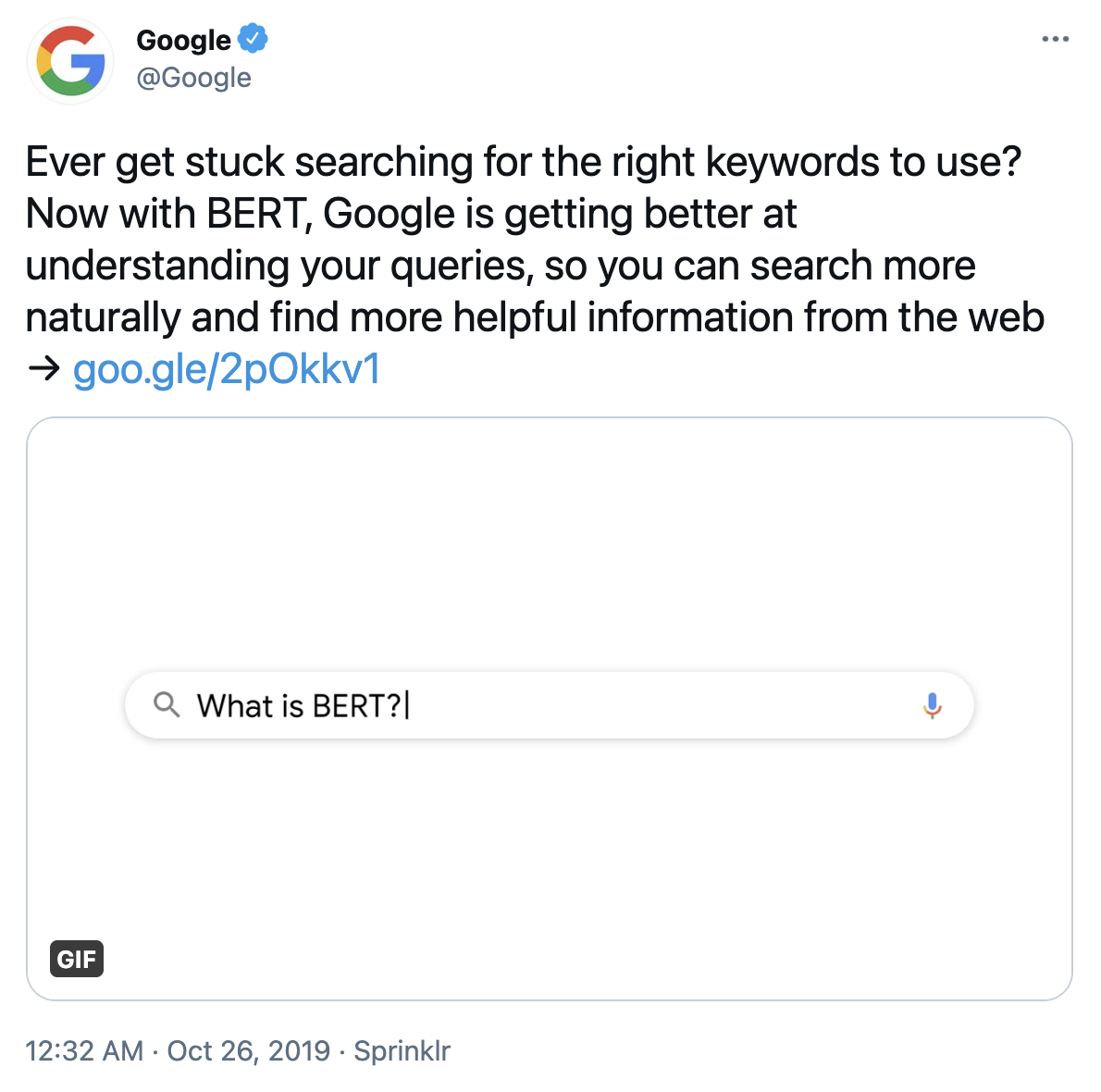
The objective of Google’s search service is to provide customers with the most relevant responses to their queries. And BERT was created to improve context understanding and to focus on the query rather than the web pages. By using sentiment analysis, salience, and context, BERT allows for far more natural results.
For customers, BERT has meant that they’re able to word their searches in a much more natural way than the old Yoda-style composition of a query. It also means that customers are more likely to gain super-relevant responses quickly. For businesses, the result has been more traffic — and more relevant traffic — which leads to more conversions.
BERT differs from everything that’s gone before in a number of ways
Pre-training – For the first time, BERT is able to pre-train on pure unlabeled text rather than labeled corpora, and it does this through unsupervised learning. Needless to say, both users and experts saw this as a quantum leap for searches.
Bi-directional – Until BERT, Google’s search engine struggled to understand sentences as a whole which led to some response errors. BERT is able to understand how each word in a sentence affects the others to gain a more natural understanding.
Transformer Architecture – This allows Google to go deeper by analyzing each word in an intelligent and natural way in order to do away with ambiguous meanings.
Masked Language – BERT’s architecture is able to identify words that have been masked out in a sentence and then effectively predict what that word might be. It then factors this into its determination of search intent.
Textual entailment – Not only can BERT predict what the next word in a sentence might be; it can even predict what your next sentence might be – taking the words right out of your mouth, so to speak.
While BERT was, without a doubt, a major breakthrough, it wasn’t without its critics.
Many website owners complained that their rankings plummeted following the launch of the new algorithm. Needless to say, they weren’t happy about it.
“BERT is amazingly effective at understanding the context behind a search and matching it with relevant pages. This means that, in most cases, it’s a great thing for brands and businesses. It won’t, however, help you if the focus of your page is weak or your content is badly written. This is generally where the complaints about BERT are coming from. People who are not focusing enough on great, well written, thought leadership content.” —Jack Zmudzinski, a senior associate at future-processing.com
BERT and the Pandemic
Until around March 2020, brands and companies around the world had been quietly going about their business. The business included, in many cases, modest SEO efforts. Then COVID-19 began its whirlwind of disruption, closing the doors to brick and mortar businesses and sending everybody home.
The pandemic resulted in more businesses moving online in order to survive — and millions more people taking to the internet to do their shopping. The online stats included demographics who had previously shunned the world wide web in favor of traditional stores.
One such demographic is those aged 75 and over; a group whose internet use increased by 54% in 2020. As the world began to lock down, people began to teach their parents and grandparents to use shopping sites in order to retain their independence.
Can You Tell Me How to Get…
For businesses, the pandemic has meant that SEO (Search Engine Optimization) is more important than ever. With a huge increase in competition, brands have had to grasp every possible advantage online if they want to have a hope of riding the wave of COVID-19 and coming out the other side.
SEO is all about figuring out what people are searching for in relation to your brand. You want your brand or product to appear quickly when someone searches for it. The process of having your brand appear closer to the top of a persons’ search involves working out “search intent,” which can be a teeny bit trickier.
Search intent speaks to what the user hopes to achieve from their search – i.e., What are they searching for? Do they just want information? — OR, do they want to buy something? Do they want a comparison of products or services? Do they want the local location to buy your product or service? — OR do they want to know where to find your item online?
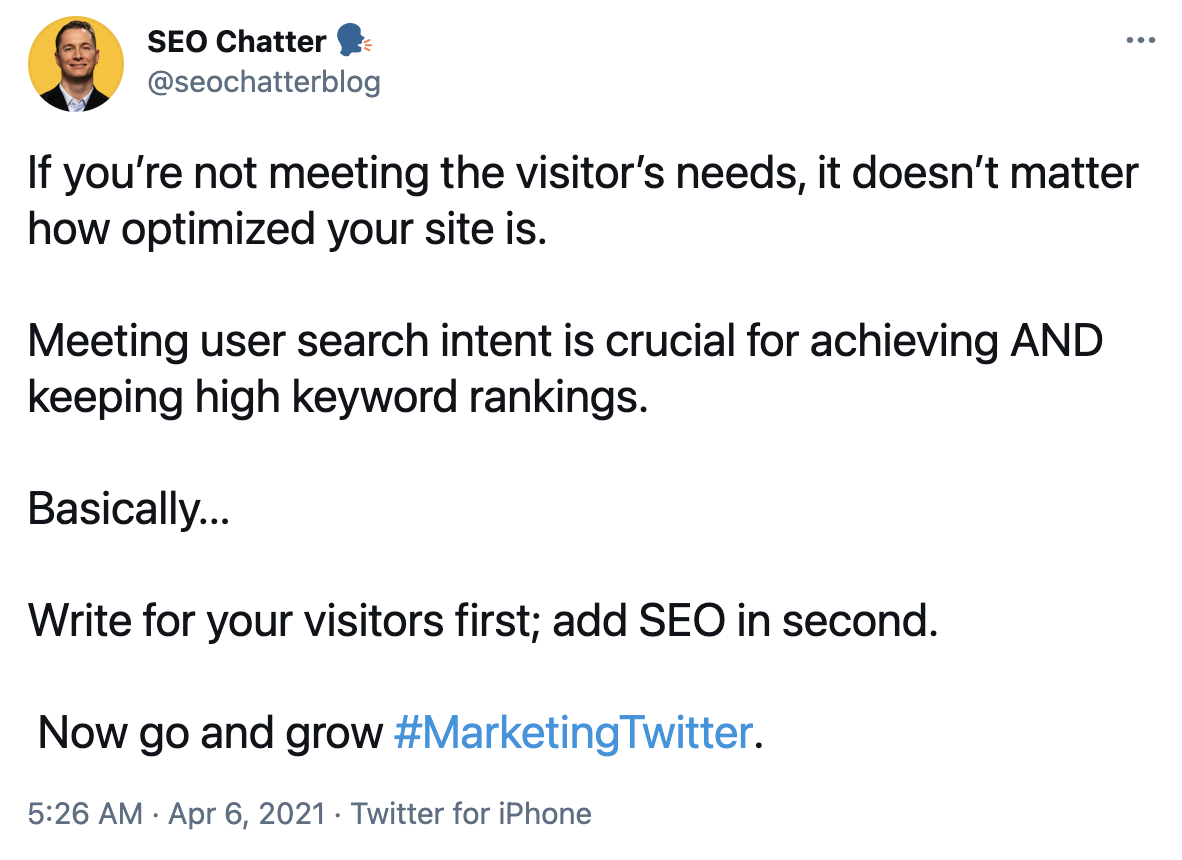
Having figured this out, brands can then tailor their content and advertising accordingly.
“The thing to remember about Google is that it’s not so much about handing over search results. It’s about solving problems for its users – whether they’re looking for a local hairdresser or they want a software developer to build them an app. The BERT algorithm has been a game changer for business owners and marketers. It essentially provides a kind of personal assistant which is able to understand what people are looking for and why they’re looking for it.” —Dima Suponau, Founder of numberforliveperson.com
While many things have changed since the beginning of 2020, one thing remains the same. SEO is achieved most effectively through engaging, thought leadership content. Content marketing remains hugely relevant in 2021, with a leaning toward long-form articles and blogs which aim to provide real, actionable information. The devastating pandemic represented a call to arms in terms of SEO – and BERT rose to the challenge.
Search on in 2021
It won’t come as any surprise that 2020 was a busy year for Google. The year started with Google’s expected core update in January, which took just four days. Usually, it takes at least two weeks — something which sets the scene for the rapid changes which would follow.
During the year, several initiatives made the news, including Google’s organic shopping listings and a call for greater gender and diversity equality in the page experience update.
In October 2020, Google held its annual SearchOn event in which it showcased its achievements and future plans. During the event, the internet giant announced that BERT is now powering almost all English language queries. It rose to almost 100% from just 10% shortly after its inception.
You can argue that this makes BERT one of the most significant leaps forward for SEO in the history of the internet.
As Google continued its commitment to making BERT as effective as possible, 2020 saw the departure of Timnit Gebru, a member of Google’s Ethical AI team.
The story went that Google fired Gebru after writing and distributing a research paper on bias in AI systems; something which jarred with Google’s purported commitment to improving diversity and equality in its searches.
Despite this, Google maintains its claims of close to 100% effectiveness — something which is mirrored by millions of its users.
A Rite of Passage
One Google advancement which has people all hot under the collar is that of passage indexing. When somebody conducts a really specific, niche search, this can be quite difficult to get 100% right for Google. The required response may be buried in a random page within a large amount of text.
To get around this, Google introduced Passage Indexing. The platform performs its usual search magic and then shows specific passages from pages or documents within the search responses in order to provide another level of context.
Google’s Raghavan says, “Very specific searches can be the hardest to get right, since sometimes the single sentence that answers your question might be buried deep in a web page. We’ve recently made a breakthrough in ranking and are now able to not just index web pages, but individual passages from the pages.
By better understanding the relevancy of specific passages, not just the overall page, we can find that needle-in-a-haystack information you’re looking for. This technology will improve 7 percent of search queries across all languages as we roll it out globally.”
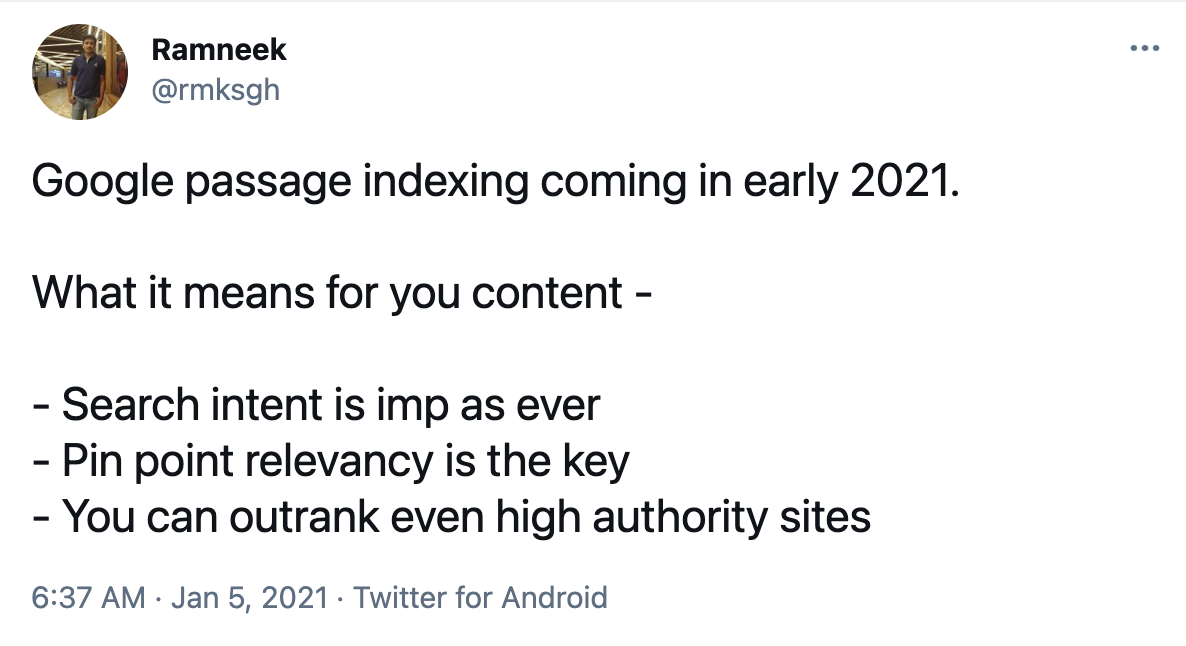
This increases the chances of being able to find relevant information which is unlikely to appear in a straight-up search. This, of course, goes hand in hand with our friend, BERT.
Beating BERT at His Own Game
Once marketers understand the importance of BERT, they’re then able to figure out how to make it work for them. Both advertising and content marketing can harness the power of BERT:
Content marketing
As we’ve mentioned, BERT’s job is to effectively give users what they’re after by doing comprehensive and natural language searches. By using technology known as Natural Language Processing (NLP), Google’s algorithm is able to put phrases and words into context, as well as learn semantics as it goes.
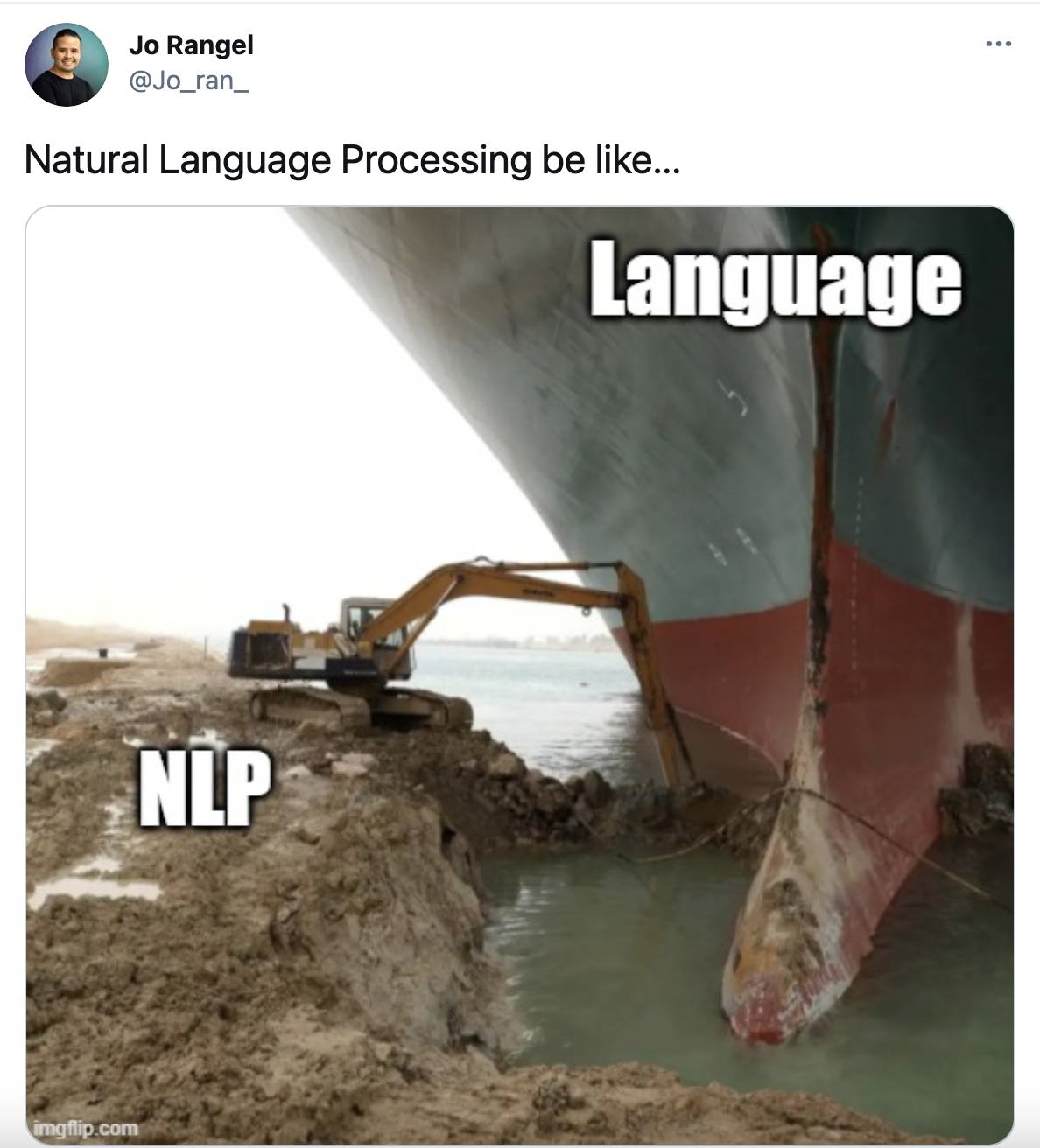
For the content marketer, this presents some great opportunities. Focusing on search intent and placing this organically into their content will work to capture BERT’s attention. As also mentioned, BERT will tend to shun content that is unfocused or badly written. In 2021, getting your content right really is more important than ever.
PPC
Pay Per Click advertising is not new, but it is changing. For some time now, succeeding with these has meant getting on board with AI and search intent, but it’s so much more than that.
The advent of BERT has meant that Dynamic Search Ads are now very much the way forward for marketers. These naturally leverage Google’s artificial intelligence features in order to create relevant adverts.
These adverts work perfectly with BERT to drive ROI on your campaign and can also help Google to improve Featured Snippets going forward. These are, of course, the holy grail for business owners and marketers.
When putting together both your content and your adverts, you need to purge yourself of a particular myth that has been flying around regarding BERT. If you’ve spent any time online, there’s a good chance that you’ll have seen people claiming that you should only optimize your content or site for long-tail queries.
The “only long-tail query” is absolutely not true, as BERT is much cleverer than that. BERT’s very nature means that it is always looking to understand the meaning behind a query. For this reason, the combination of long and short-tail keywords is much more effective.
Conclusion
Google’s figures regarding BERT’s reach speak for themselves. With almost 100% of English language responses being covered, it makes it even more difficult to understand.
It is difficult to understand why so many marketers have not yet put in the time or effort to properly understand what BERT is — and what it can do for them.
Google does not, of course, standstill. I’m pretty sure we can expect even more revolutionary advances and updates in 2021. If you know what’s good for you, you best be ready!
Top Image Credit: hannah wright; unsplash
The post BERT and the Pandemic – A New Wave for the Algorithm appeared first on ReadWrite.
(42)

